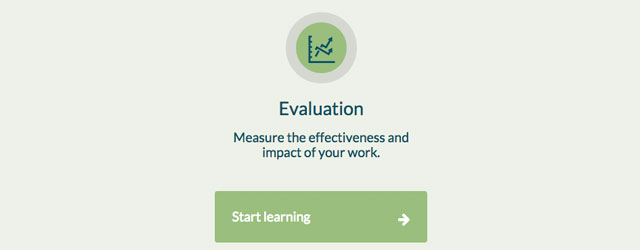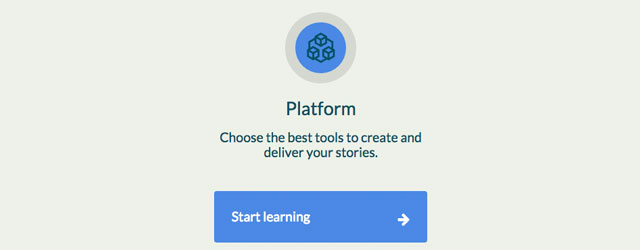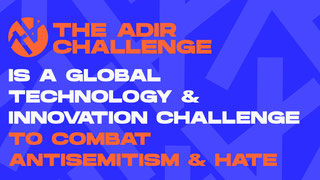“Come then, and let us pass a leisure hour in storytelling, and our story shall be the education of our heroes.” – Plato
The power of storytelling is well documented. Stories connect us in ways other communications simply cannot. The best stories touch us, inspire us, and move us to act.
Maybe it’s a story about a single individual overcoming an obstacle or transforming before our eyes. Maybe it’s an origin story of an idea that went on to change the world. Or maybe it’s a story still unfinished that poses more questions than answers.
Stories take different forms – and they’re shared in different ways. But all stories reveal universal truths, and deepen our understanding of the world around us.
As a Rockefeller Foundation grantee, you have incredible stories inside your organization. Stories of how you have impacted the world, empowered others to make change, or learned from well-made mistakes. Stories that could help generate awareness, explain complex issues, demonstrate valuable models for change, or inspire others to join your cause.
Through the Rockefeller Foundation Storytelling Challenge, The Rockefeller Foundation is inviting selected former and current grantee organizations to submit your best stories. They can be told through any platform - written, audio and/or visual, multimedia…even interpretative dance!
You can submit existing stories or develop new stories that you have been meaning to tell. For inspiration, check out The Rockefeller Foundation’s suite of storytelling resources at hatchforgood.org.
The challenge launches on February 17, 2015 and closes on May 27, 2015, at 5pm PDT.
Two $50,000 (USD) grants, for operating support, will be awarded on July 7, 2015.
The Challenge
Stories connect us in ways other communications simply cannot. The best stories touch us, inspire us, and move us to act. The Rockefeller Foundation Storytelling Challenge is an opportunity to share your best stories and to tell us how they encouraged people to take action. They can be told through any platform - written, audio and/or visual, multimedia…even interpretative dance! The Challenge invites select current and former Foundation grantee organizations to participate.
The challenge will award 2 grants for $50,000 (USD) each:
- The first award asks you to look back on how your organization created impact with a story. How did you do it? What did you do? What impact did you create for your organization?
- The second award asks you to look forward on how you will create impact with a story. How will you do it? What will you do? What impact do you anticipate will be created?
Eligibility Requirements
The Rockefeller Foundation Storytelling Challenge will award two $50,000 (USD) grants for operating support. The Challenge invites current and former foundation grantee organizations that are qualified under U.S. law to receive and comply with the terms of a general support grant from The Rockefeller Foundation to submit your best stories. These grantees will receive an email on February 17, 2015 with the code to register for the challenge. If you are a grantee and you have lost access to this email, please contact .
- Eligible organizations can submit entries for both awards.
- Organizations are eligible to win both awards.
- Only 1 submission per award is allowed.
- If submitting the same story for both awards, the intended impact for award #2 must be different/unique than how the story was utilized previously.
Schedule
| Date |
Challenge Phase |
| February 17, 2015 |
Challenge launches
Registration opens
|
| May 27, 2015* |
Challenge submissions close (5pm PDT) |
| July 7, 2015 |
Awards announced |
*Deadline extended from May 18, 2015.
Submission requirements
The Rockefeller Storytelling Challenge will award up to two $50,000 (USD) grants for operating support. Eligible organizations can submit entries for both grants and organizations are eligible for both grants. Only 1 submission per grant is allowed. If submitting the same story for both grant #1 and grant #2, the intended impact for grant #2 must be different/unique than how the story was utilized previously.
Each submission will be judged out of a total of 100 points:
- 50 points for the story
- 50 points for the impact
Grant #1 Submission must include:
| Part 1: The story |
- A video, speech, brochure, campaign, article, music, etc.
- Any uploaded materials must be submitted via a link only.
|
| Part 2: The impact |
- A narrative describing the impact the story has created for your organization.
- A brief organizational background.
- This part may not exceed 3 PDF pages, formatted with 1” margins and Times New Roman, 12pt font.
|
Grant #2 Submission must include:
| Part 1: The story |
- A video, speech, brochure, campaign, article, music, etc.
- Any uploaded materials must be submitted via a link only.
|
| Part 2: The impact |
- A narrative describing the impact the story will create for your organization
- A brief organizational background
- This part may not exceed 3 PDF pages, formatted with 1” margins and Times New Roman, 12pt font.
|
Judging
Judges
The Judging Panel will include highly qualified and impartial judges. All members of the Judging Panel will be required to adhere to non-disclosure agreements as required and statements acknowledging that they make no claim to the Intellectual Property developed by competitors.
The Rockefeller Foundation will, in its sole discretion, make the final decision regarding the awarding of the two grants. Prior to making each grant, The Rockefeller Foundation will complete a due diligence process to confirm that the potential grantee is qualified under U.S. law to receive and comply with the terms of a general support grant from The Rockefeller Foundation.
Judging Criteria
Each submission will be judged out of a total of 100 points:
- 50 points for the story
- 50 points for the impact
Grant #1 Judging Criteria:
Part 1: The Story – 50 points
| Criteria |
Description |
Score |
| Well-crafted story |
high-quality story with
- clear goals and objectives
- an audience in mind
- a point of view
- a beginning, middle, and end
|
20 points |
| Engaging, compelling |
were you touched, moved, or inspired by the story |
20 points |
| Call to action |
did you, as a judge, clearly understand what you were supposed to do? Was the call to action clear? |
10 points |
Part 2: The Impact – 50 points
| Criteria |
Description |
Score |
| Overall impact on the mission of your organization |
How did this project impact the mission of your organization, positively or negatively? |
20 points |
| Results |
What did you achieve? What was the impact of telling this story? Who did you reach? Who did you need to reach? |
20 points |
| Goals and Strategy(ies) |
How did the goals of the story align with the story you are telling? How did the strategy support you in meeting your goals? What tools and resources did you use to meet your goals? |
10 points |
Grant #2 Judging Criteria:
Part 1: The Story – 50 points
| Criteria |
Description |
Score |
| Well-crafted story |
high-quality story with
- clear goals and objectives
- an audience in mind
- a point of view
- a beginning, middle, and end
|
20 points |
| Engaging, compelling |
were you touched, moved, or inspired by the story |
20 points |
| Call to action |
did you, as a judge, clearly understand what you were supposed to do? Was the call to action clear? |
10 points |
Part 2: The Impact – 50 points*
| Criteria |
Description |
Score |
| Plan and goal(s) of plan |
How will you amplify your story? Who will you reach? Who do you need to reach? What impact will amplifying your story have on your mission? |
25 points |
| Measurable criteria |
How will you measure your story’s reach? (e.g., number of views, dollars raised, new members) |
15 points |
| Overall impact on the mission of organization |
If you achieve the criteria set forth in your plan, what impact will they have on organizational goals? |
10 points |
* if using the same story as submitted in Grant #1, the intended impact must be different/unique than how the story was utilized previously.
Challenge Details
Rules
Challenge rules and dates are subject to change. All registered teams and individuals will be informed of any rule changes and any changes will be posted on the Challenge page.
Only 1 submission per grant is permitted.
All submissions must be received on May 27, 2015, by 5pm PST.











